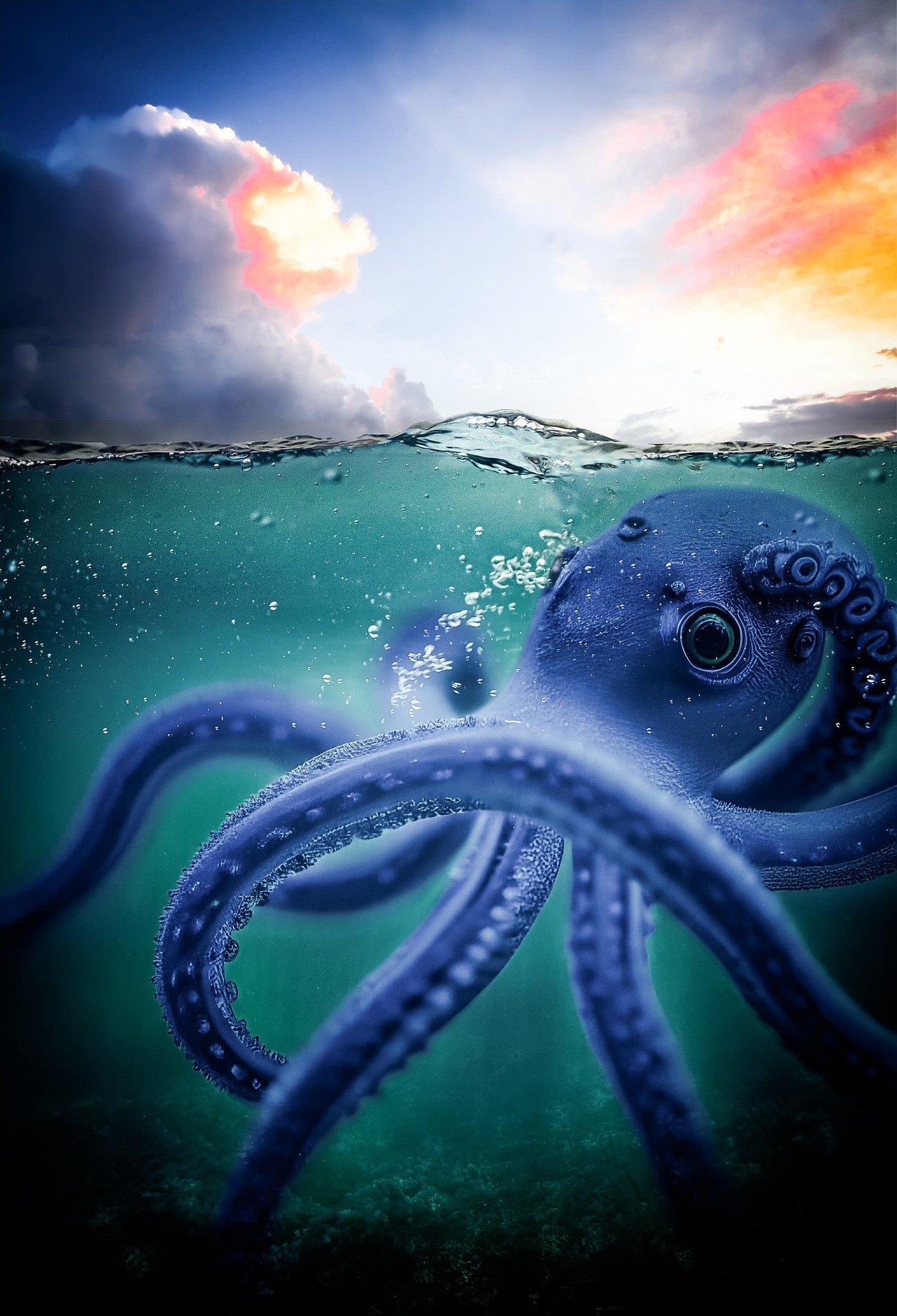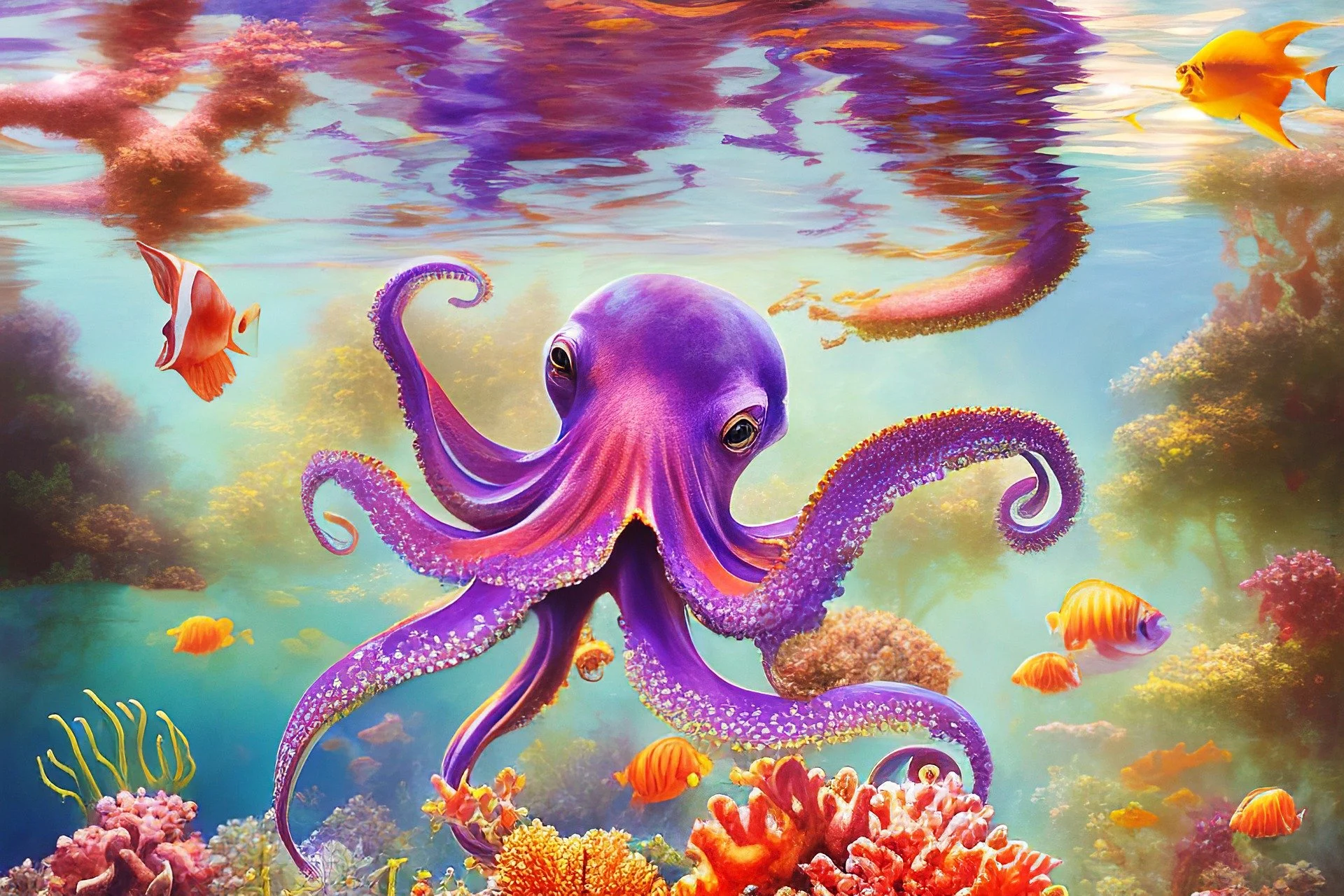Octopus Symbolism Across Cultures: From Terror and Cunning to Protection and Regeneration
The Symbolism of Octopuses: Intelligence, Adaptability, Agility, Empathy, Altruism, & Regeneration
(Image by Pete Linforth from Pixabay)
Octopuses are known for their remarkable intelligence, which sets them apart from other invertebrates. Unlike their counterparts, they do not rely on shells for protection, thanks to their impressive dexterity and mobility. In addition, their tactile sense is exceptional, while their eyes bear an uncanny resemblance to the highly evolved human eye.
Octopuses are masters of disguise and adaptability. These enigmatic creatures are shapeshifters, changing their colors to reflect their inner state or blend in with their surroundings as a defense mechanism against predators.
In addition to their impressive chameleon-like abilities, octopuses can also impersonate other marine creatures, such as sea snakes, to evade danger.
Octopuses are renowned for their remarkable agility and multitasking abilities, transitioning effortlessly from masters of disguise to skillful hunters. They can crack open shells to access their prey with their sophisticated mouths that function like tools. Furthermore, their flexible and muscular arms enable them to carry out multiple actions simultaneously. As if that weren't enough, their tentacles have numerous small limbs that act as mini-brains, enabling them to perceive and respond to their surroundings with incredible precision.
In moments of calm and mutual respect, divers have been known to establish empathic connections with these fascinating beings. However, when threatened, the octopus retreats swiftly, enveloping itself in a dense, murky cloud of ink.
Moreover, octopuses are revered as symbols of altruism, representing qualities of selflessness and self-sacrifice. Following the breeding season, the male octopus will perish, leaving his female partner to care for the eggs alone until they hatch. Despite the risks involved, the female octopus will fiercely defend the eggs, even if it means sacrificing her own safety and sustenance.
With a remarkable ability to regenerate lost parts, the octopus is one of the few creatures in the animal kingdom with this remarkable trait. While alligators are known for regrowing their tails, and starfish can regenerate their arms, the octopus has the unique ability to regrow arms and tentacles. This exceptional capability has made the octopus a symbol of renewal and recovery, representing the power of healing in nature.
The Symbolism of the Octopus in Ancient Mythologies
With its eerie, shape-shifting presence, the octopus has long been a source of fascination and terror for humanity. Emerging from the depths like an amorphous phantasm, its eight tentacles reaching out like tendrils of the unknown, it has captured our deepest imaginings about the mysteries of dissolution and regeneration.
Throughout history, the octopus has been regarded as one of the most hideous and terrifying creatures of the sea, capable of sinking large ships to a watery grave. Its monstrous appearance and ability to reside in the deepest, darkest places of the ocean have led to it being linked with the spirits of the Underworld. Indeed, like other archetypal creatures of the deep, the octopus has always held a dark and mysterious allure that continues to captivate us to this day.
(Image from Pixabay)
The Symbolism of the Octopus in Babylonian Myth
The octopus has been intertwined with the concept of the Great Mother since time immemorial. This fascinating creature has been a powerful symbol of female power across cultures and throughout history.
In ancient Babylonian myths, the goddess Tiamat was closely associated with the octopus, embodying the raw force of feminine energy. She waged war against the deities and was eventually defeated by the storm god Marduk, whose victory marked a turning point in the shift from matriarchal to patriarchal societies. From Tiamat's body emerged the heavens and the earth, forever linking the octopus with the creative power of the divine feminine.
The Symbolism of the Octopus in Japanese Myth
In Japan, towards the west of Oceana, the Indigenous Ainu People and the followers of Shintoism have woven stories about a colossal creature that resembles an octopus, known as Akkorokamui.
This spirit is described as a combination of a human and an octopus and is considered benevolent by the locals. The legends suggest that Akkorokamui resides in the waters of Funka Bay in Hokkaido and, like an octopus, can regenerate its limbs if damaged. This unique ability has led the Ainu to believe that Akkorokamui possesses powerful healing qualities. Therefore, they have faith that presenting a tribute to Akkorokamui can aid in the recovery of injured limbs.
The Symbolism of the Octopus in Hawaiian Myth
In the sacred traditions of Hawaii, the god Kanaloa embodies the majestic form of an octopus or squid, a revered deity of healing who holds sway over the mystical Underworld - that realm of impenetrable mystery and untold secrets, which is forever linked to the all-encompassing sea.
As the consort of the mighty creator deity Kane, Kanaloa embodies a perfect balance of cosmic forces, evoking a sense of harmony and equilibrium that echoes through the very fabric of existence.
The great god Kanaloa is also associated with a symbol known as the Eye of Kanaloa. This mystical emblem can be glimpsed by gazing deep into the eyes of the divine octopus itself. This potent symbol represents the interconnectedness of all things, the web of life that links us all together like the intricate strands of a spider's web.
The Symbolism of the Octopus in Ancient Greek Myth
(Image from Pixabay)
The octopus has left an indelible mark on the art and mythology of Minoan/Cretan and Greek cultures, serving as the prototype for legendary figures such as the multiheaded Hydra and the paralyzing Medusa.
This enigmatic creature is deeply intertwined with the astrological sign of Cancer, the moon, the summer solstice, and the unfathomable depths of the ocean.
Like its cosmic cousins, the whirlpool, the spider's web, the wheel, and the spiral, the octopus embodies both the mystical center of the Universe and the process of creation itself. Its sinuous tentacles reach the furthest reaches of our imagination, beckoning us to dive deep into the vast and wondrous mysteries of the cosmos.
In the eyes of the ancient Greeks, the octopus and the legendary seafarer Odysseus were both known as "polymetis," evoking the concepts of wisdom and cunning. It is possible that the sea monsters who haunted Odysseus and his crew were symbolic of the disturbing, undifferentiated aspects of the classical Greek psyche, representing chaos and the unknown. These creatures were viewed as treacherous and deadly, posing a significant threat to those who dared to venture into the dark, unpredictable depths of the sea.
However, through his shrewd wit and cunning, Odysseus can outsmart these monsters and emerge victorious from their perilous clutches. In this way, he embodied the power of the human mind to conquer even the most formidable obstacles, both in the physical world and within the recesses of the human psyche.
The Symbolism of the Octopus in Scandinavian Myth
One of the most enduring legends of the sea is undoubtedly that of the Scandinavian Kraken (sometimes called Hafgufa), a terrifying sea monster often depicted as a giant squid of monstrous proportions.
In ancient myths, this elusive creature was said to be as colossal as an entire island, capable of churning up powerful whirlpools and swallowing entire ships whole. This awe-inspiring beast even made its way into the pages of the acclaimed "Natural History Of Norway" (1752), where it was believed that certain islands marked on maps were actually the Kraken itself, lying dormant on the ocean floor.
Indeed, the Kraken has captured countless generations' imaginations, embodying the ocean's unfathomable mysteries and the timeless power of myth and legend.
The Symbolism of the Octopus in Celtic Myth
The Celts did not have a strong maritime culture like the Greeks and Vikings, but they saw the octopus as vicious. In fact, one legend describes the octopus as capable of consuming a knight in armor by sucking him into its mouth.
They also blamed octopuses for disastrous oceanic events like floods. Like the Greeks, the Celts portrayed octopuses as fiends and impediments to the story's heroes. In one tale, the Druid god Dagda kills an octopus with his "mace of wrath" as if killing a dragon. He chants words commanding the octopus to leave, and the sea retreats with the creature, possibly giving the place its name, Mag Muirthemne.
The Symbolism of the Octopus in Indigenous Traditions
Kumugwe & his Octopus Guardians
The Indigenous tribes of the Pacific Northwest revered octopuses as intelligent and cunning creatures, as they were believed to possess the ability to trick and deceive. In their mythology, the god Kumugwe, also known as "Copper-Maker," presided over the undersea realm, dwelling in a magnificent house filled with riches.
Many brave heroes embarked on quests to reach his subaquatic abode, hoping to receive bountiful treasures and spiritual powers as a reward. However, the octopus was appointed as the guardian of Kumugwe's domain, and only those who could outsmart or appease the creature could proceed.
Sometimes, Kumugwe himself was portrayed in the form of an octopus. In addition, the masks of Kumugwe were adorned with aquatic features, including fish eyes, gills, fins, and suction cups of an octopus, as well as depictions of other sea animals like loons, seals, sea lions, orcas, and sculpins, which were his most significant familiars.
The Octopus Maiden and Raven
In another particular tale, an Octopus Maiden, who had eight lengthy braids, was digging clams by the seashore. While busy, Raven appeared and repeatedly questioned her about what she was doing. Despite disregarding him for some time, Octopus Maiden eventually stopped her task. She seized Raven by the neck with one of her braids, held him down in the water, and refused to release him even as the tide rose. Raven implored her to let him go, but instead of complying, Octopus Maiden repeated her answer to Raven's initial question about digging clams the same number of times he had asked it. As the sea engulfed Raven and he drowned, onlookers, who recognized him as the trickster Crow, showed no sympathy. Though Raven ultimately came back to life, he never again bothered Octopus Maiden.
Inviting the Octopus Within
(Image from Pixabay)
Although the thought of sea monsters and mythical tales may evoke a sense of trepidation, the octopus transcends its peculiar appearance and is imbued with multifaceted symbolism. It embodies traits such as intelligence, altruism, adaptability, rejuvenation, and awareness.
By respecting and learning from the wise and versatile octopus, we can access its ingenuity and imagination to navigate the intricacies of our own existence. The octopus symbolizes the importance of honoring our distinctive viewpoints and approaching life with awe and admiration for the enigmas that lay beyond our comprehension.
What personal meaning do you attach to the symbolism of the octopus?
How has the octopus appeared in your life, and what significance do you give to these encounters?
Have you encountered the octopus in your dreams, and if so, what message might it be trying to convey?
Warmly,
Anny
💦🐙💙
References used:
Martin, K., & Ronnberg, A. (2010). The book of symbols: Reflections on archetypal images.
Wilkinson, P. (2014). Signs & Symbols: An illustrated guide to their origins and meanings. Metro Books.
Kindly note: The information included in this blog is not intended nor implied to be a substitute for mental health services. Please consult with a qualified professional to determine the appropriateness of the information for your own life experiences or if you have any questions.




